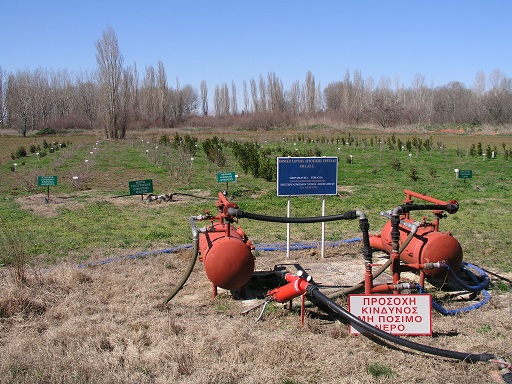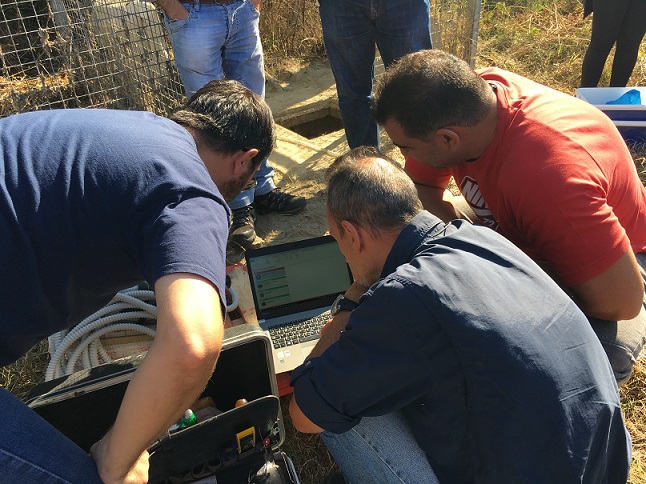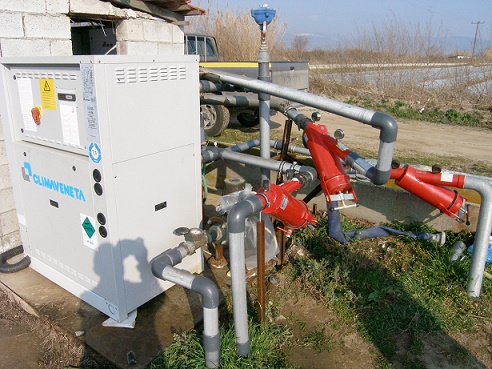Research & Development
Water resources protection-management
Water resources protection-management
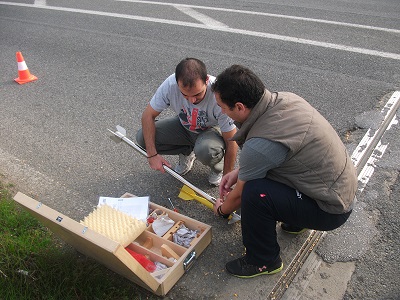 |
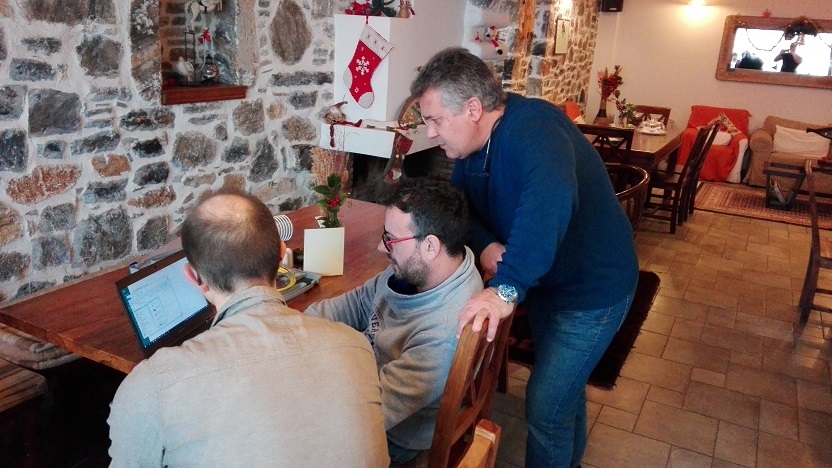 |
LRD contributes to the protection and management of surface water and groundwater with actions relating to the:
- compilation, justification and operation of networks for monitoring quantity and quality parameters
- design, installation and operation of reference stations for monitoring water flow and quality in rivers
- measurement of river flow, stage-discharge curve and velocity-discharge index methods
- assessment of quantity and quality status of water systems and harmonisation to alternative reference standards and related legislation – water resources typology
- development and application of mathematical models to simulate the processes of the hydrological cycle and other biogeochemical cycles (e.g. nitrogen) at agricultural field and catchment area level
- risk and impact assessment of quantity and quality deterioration of water systems, protection/recovery of water systems
- seawater intrusion in coastal aquifers: protection and restoration
- management of nitrates and other agricultural origin pollution of water systems
- assessment of aquifers’ intrinsic and specific vulnerability
- climate change impact assessment; mitigation and adaptation measures
- water governance strategies on socioeconomic and administrative structures, especially at local scale
- environmental impact assessment of agricultural practices and evaluation of farmers’ environmental performance
Obtaining additional water resources
Obtaining additional water resources
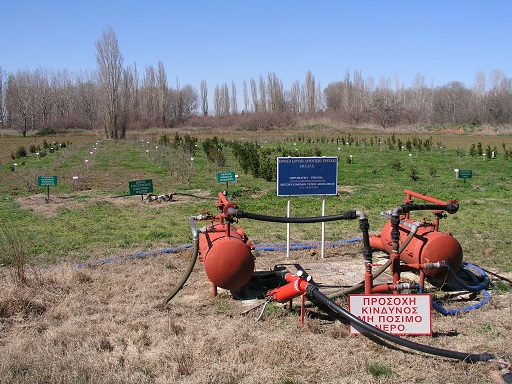 |
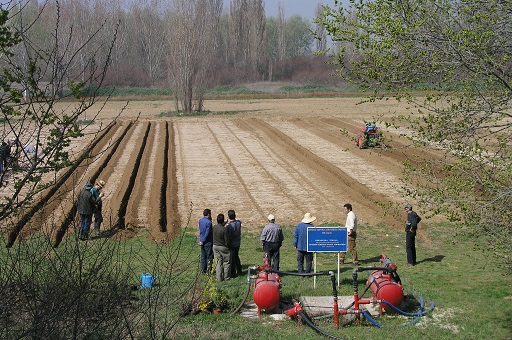 |
LRD studies and develops methods to provide additional water resources for the environment and agriculture:
- use of deteriorated water in irrigation
- drainage water
- brackish water
- treated wastewater effluent
- olive mill wastewater and other agricultural products processing units effluent
- artificial groundwater recharge
- winter runoff management (river or bank-side reservoirs, barrier dams, etc.)
Irrigation water management
Irrigation water management
 |
 |
LRD develops the necessary tools and applies the appropriate techniques and methods to achieve optimal management and use of irrigation water:
- assessment of water consumption by plants and study of water dynamics at root zone using numerical models and lysimeters
- irrigation scheduling based on climatic, crop and soil data
- assessment of water-yield response factors for deficit irrigation
Management-restoration of irrigated soils
Management-restoration of irrigated soils
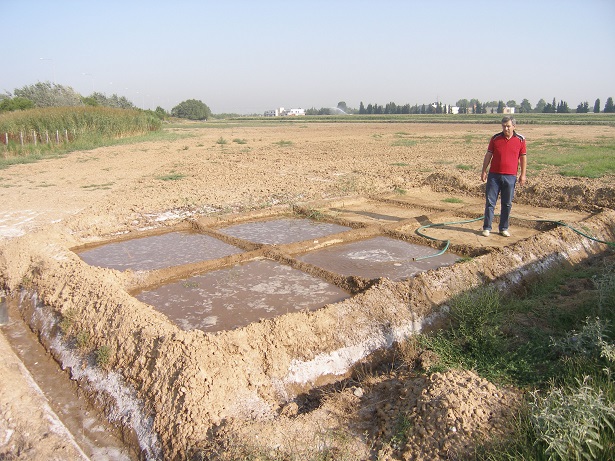 |
 |
LRD promotes the sustainable management of irrigated soils and the restoration of degraded soils, by:
- proposing management measures and fertilization consultancy based on analysis and evaluation of soil properties and parameters
- restoring degraded soils (saline, alkaline, acidic)
- improving soil properties using raw or processed natural materials, by-products (such as zeolite, calcareous materials, sewage sludge, composted organic materials, etc.) and mixtures
Exploitation of geothermal energy in the field of agriculture and fisheries
Exploitation of geothermal energy in the field of agriculture and fisheries
 |
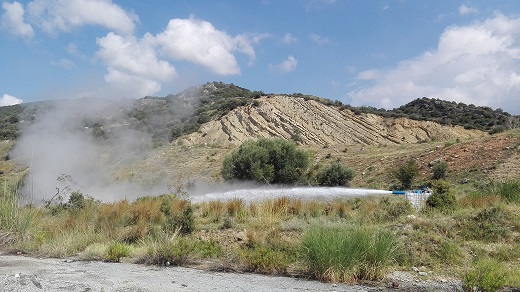 |
LRD contributes to the exploitation of the renewable and environmentally friendly geothermal energy of low or mid enthalpy in the agricultural sector. At the same time, utilising geothermal heat pumps and shallow geothermal energy, it contributes to the reduction of production cost and ultimately to the amelioration of the value-added agriculture. The main research activities are:
- design-supervision and assessment of exploration-production wells and energy dedicated wells for the utilisation of low enthalpy geothermal fields and shallow geothermal energy
- design-supervision and evaluation of pumping tests in geothermal wells, reservoir engineering studies and mathematical models application for the optimal management of geothermal systems
- anti-freezing protection of coastal open pond fish farming facilities with the direct or indirect utilization of geothermal fluids
- experimental fish farming using geothermal fluids, either directly or through heat exchange
- agricultural products dehydration using geothermal energy
- exploitation of shallow geothermal energy by the use of heat pumps in the field of agriculture
- earliness of row covered crops’ production through direct use of geothermal fluids or use of heat exchangers for soil heating
Harmonisation of National to European legislation
 |
 |
Through its participation in research and development projects, LRD acts in support of the European policy and harmonization of the national legislation on protection and management of soil and water resources to the European legislation. More specifically it has contributed/contributes by:
- developing a reference methodology for the assessment and characterization of the quantity and chemical quality status of groundwater systems
- implementing the Water Framework Directive
- implementing the Groundwater Daughter Directive on the protection and rational management of groundwater
- developing a reference method for the delineation of Nitrates Vulnerable Zones in the context of the Nitrates Directive
- compiling Programs of Measures and Action Plans for water resources protection in the context of the Nitrates Directive
- developing strategies on the sustainable management of cultivated terrain in the context of the European Thematic Strategy for Soil
- developing a reference methodology for the compilation, scientific justification and operation of networks for monitoring potential residues of the drastic compounds of plant protection products and their metabolites in groundwater bodies
- shaping the National policy on the reuse of treated domestic effluent in irrigation




